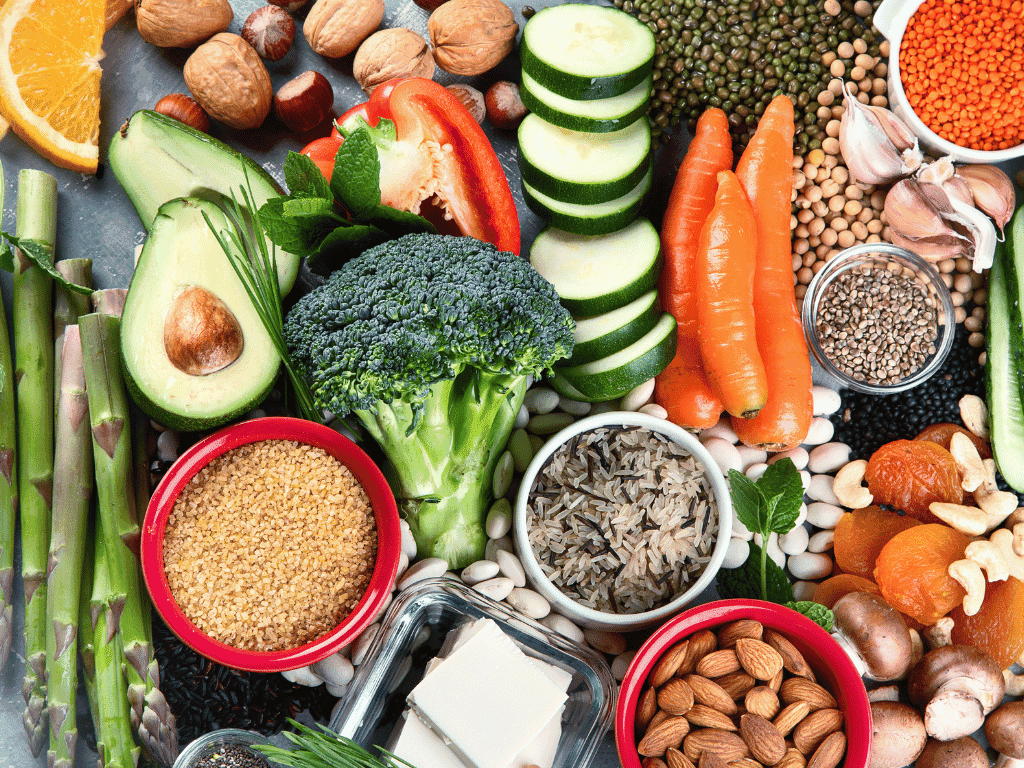
If you are searching to transform your health in a cost-effective, low-risk way, a plant-based diet is a step to consider.
Beyond being a trend, the shift towards plant-based diets is rooted in compelling scientific evidence that underscores the positive effects on human health and the environment.
Sit tight, as we uncover all plant-based diet benefits and risks and unveil all the truth about a plant-based diet, based strictly on recent studies.
Plant-based nutrition: an overview
Meat is not an enemy. It’s not necessarily bad for your health as it contains vital nutrients and micronutrients — like protein, minerals and fatty acids — that our bodies do not produce.
However, too much meat (especially processed meat) can lead to blood pressure spikes, high cholesterol, and rheumatoid arthritis and, in the long run, even affect your longevity.
On the other hand, there are disadvantages of a plant-based diet, such as increased risks of iron-deficiency anemia, low blood pressure, and, according to Harvard Health Publishing, a higher possibility of stroke.
Whether plant-based or omnivorous, a nutrient-poor, low-quality diet always leads to poor health outcomes.
But, transiting to a green diet doesn’t always imply giving up on meat and all animal products. These are some examples of plant-based nutrition, from very plant-focused to more flexible choices.
- Vegetarian diet. Excludes meat and seafood but includes eggs and dairy products (like cheese and yogurt). It also includes plant-based foods like fruits, vegetables, grains, legumes, nuts, and seeds.
- Vegan diet. Excludes all animal products including meat, seafood, poultry, dairy, eggs, and honey. Focuses solely on plant-based foods.
- Mediterranean. Focuses on plant foods like fruits, vegetables, whole grains, nuts, olive oil, some dairy, and fatty fish. May sporadically include poultry and red meat.
- Plant-based keto diet. Combines the principles of a ketogenic diet with plant-based foods. Emphasizes low-carbohydrate, high-fat plant sources like avocados, nuts, and seeds.
How Is Plant-Based Nutrition Beneficial?
One vegan diet research paper confirmed that quality, whole-food, plant-based diets are able to mitigate a plethora of health conditions including lowering cholesterol and blood pressure as well as lowering risk of type 2 diabetes and heart disease.
Plant-focused nutrition was also acclaimed to be very effective for weight-loss efforts and protective against gastrointestinal disease, cancer, obesity and digestion-related conditions.
If you wonder about the immediate benefits of the plant-based diet — many of those who start their journey distinguish the feeling of “lightness” in the stomach.
What does the research say?
In 2021 there was a nutritional update for physicians with an interesting case study.
A 63-year-old patient with type 2 diabetes, a high blood pressure history, struggling from nausea, fatigue, and muscle cramps, was prescribed plant-focused nutrition and light physical activity. After a 4 month period, the patient’s blood pressure returned to normal levels, his cholesterol was significantly lower and his diabetes was under control with a single medication.
There are also notable benefits of a plant-based diet on the environment.
Another study of 2021 indicated that the transition to plant-based nutrition has the power to cut down the land we use for food by 76%, decrease the gasses that contribute to climate change by almost half, reduce water pollution by 49%, and save a lot of water.
How to Adopt a Plant-Based Diet?
First and foremost, you want to consult your healthcare provider to choose the right type of plant-based nutrition for you.
It’s vital to understand that the plant-focused diet should be adopted gradually — by incorporating more vegetables, nuts, seeds and greens into your regular diet, and moderately excluding animal products or meat. It’s also important to be aware of the nutritional differences of plant-based foods and understand that in order for it to yield positive outcomes the diet should be focused on whole plant foods rather than “junk” or highly processed plant-based foods like chips, cookies, candy, etc.
How to prepare yourself for a meat-free diet?
The most essential part of a proper green diet is ensuring the replacement of all nutrients and micronutrients that would otherwise be obtained from animal products and are not produced by your organism.
Breaking a common misconception, properly planned plant-based nutrition allows you to obtain all essential nutrients like proteins, fatty and amino acids, and other micronutrients:
- Protein. Combinations of legumes, grains, nuts, seeds, and soy products. Consider additional plant based supplements like our non-GMO pea protein and organic rice protein.
- Vitamin B12. Fortified foods like plant-based milk, breakfast cereals, and nutritional yeast. Consider B12 supplements, especially for those following a strict vegan diet.
- Iron. Lentils, beans, tofu, quinoa, and fortified cereals.
- Omega-3. Chia seeds, flaxseeds, hemp seeds, walnuts, and algae.
- Vitamin D. Fortified plant-based milk, orange juice, and cereals (can also be obtained th!).
- Zinc. Legumes, nuts, seeds, and whole grain foods.
- Calcium. Leafy greens (kale, bok choy), fortified plant milk, tofu, and almonds.
To see no deficiency of crucial protein in your diet, resort to our protein calculator and effortlessly figure out the daily norm specific to your organism.
Eat Green, Feel Great
A plant-based diet is an effective way to improve your well-being and increase the quality of your life. If you are looking to achieve your health goals, lose weight, or simply explore the benefits of green nutrition — we at Growing Natural have you covered.
Our scientifically developed pure plant proteins are designed to assist you in carving out your ideal you. Visit our shop and read more of our green guides!
